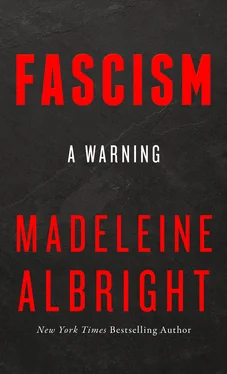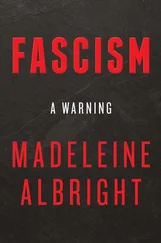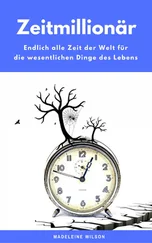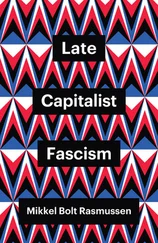Mussolini hoped for a short war and a seat on the winning side of the table when peace returned and the plunder was divided. He told advisers that, to validate his claim for money and land, at least a thousand Italian troops must die in combat, but that meant his country would have to fight. He could have taken the initiative against the British in North Africa, but his military was reluctant to strike. Then the Führer double-crossed him by securing German access to Romania’s oil fields, which Italy also coveted. “Hitler always presents me with a fait accompli,” he complained to relatives. “This time I am going to pay him back in his own coin. He will find out from the newspapers that I have occupied Greece. In this way, the equilibrium will be re-established.”
This was Mussolini’s bright idea: to invade Greece. He did so—in October 1940—contrary to the warnings of his own generals and with no heads-up to his German ally. In his fantasies, he imagined a triumphant march into Athens that would stamp the Balkans with Italy’s brand and match Hitler’s grand entrances into Vienna, Prague, and Paris. When advisers pointed to the potential dangers, he told them not to worry, that he was privy to a secret: the top Greek officials had been bribed and would not fight. He was misinformed. The defenders trounced the poorly equipped Italian troops as Mussolini’s tanks got stuck in the mud, his planes couldn’t fly because of fog, and his ships couldn’t operate effectively due to high winds and heavy seas. Instead of advancing to Athens, the Italians were driven back, thirty miles into Albania. Within weeks, a sheepish Duce had to turn to Hitler for help. The German rescue operation forced Hitler to delay his invasion of the Soviet Union until June 1941, narrowing to four months the window Nazi troops had to reach Moscow before Russia deployed its most lethal weapon—winter.
AS THE WAR HE HAD LAUNCHED SPREAD ACROSS EUROPE, HITLER thought it would be a good plan to bring Franco and Spain into the contest on his side; Mussolini agreed. They viewed the Spanish general as a fellow autocrat who could help them to secure the Mediterranean and who could furnish battle-hardened troops for future expeditions.
In 1931, Spain’s King Alfonso XIII was forced out and a democratic republic proclaimed. This was during the Depression and, as in Italy and Germany, the Spanish electorate was sharply divided between left and right. One weak government after another tried to assert authority amid crippling strikes and a rash of politically motivated assassinations. In 1936, a Socialist coalition headed by Francisco Largo Caballero, a colorless yet dogmatic prime minister, was given its chance to get Spain moving again. Army leaders, backed by some of the country’s wealthiest families, decided they had seen enough of democracy and more than enough of Socialism, then launched a rebellion that Franco was chosen to lead.
The Spanish general had neither the look nor the commanding voice of a dashing military leader. He was short, pudgy, and balding, had a droopy countenance, was prone to crying, and—when issuing orders—tended to squeak. Colleagues referred to him behind his back as “Miss Canary Islands,” a comment on both his demeanor and the remote site where he was stationed when the first shots were fired; but Franco was the sort of leader who could find his way through a minefield without putting a foot wrong. Unlike many, he expected the Civil War to be long, dirty, and closely fought. In preparation, he solicited and received aid from Hitler and Mussolini.
To the irritation of both dictators, Franco resisted pressure for bold actions that, in his judgment, would have entailed taking excessive risks. Instead he waged war like a safecracker, turning the dial one click at a time. He used aerial bombardments to soften up any opposition before attacking on the ground. He paid careful attention to logistics and didn’t squander his ammunition, equipment, or men. He moved his headquarters close to the fighting and insisted that a field commander lead in retaking any territory he lost. All this he managed while ever mindful of his position on the global stage, for the Spanish Civil War (1936–1939) was of interest not solely to Spain.
For liberals in the West, the showdown between the Spanish Republic and Franco’s nationalist rebels seemed the first real chance to stop Fascism’s terrifying advance. Volunteers from fifty-four countries, including three thousand from the United States, formed international brigades to assist in the cause. The Largo Caballero government, still desperate for help, turned to Stalin, who offered men and equipment in return for a clandestine shipment of the country’s entire supply of gold. Celebrity photographers, poets, and writers—Ernest Hemingway included—hurried to chronicle and at times glamorize the competition between the forces of light, as they saw it, and darkness.
The conflict, though, was anything but romantic. It lasted three years and killed more than half a million people. There were long lulls, but the clashes were savage. Each side executed prisoners, and each cast a wide net in arresting enemy sympathizers. For Franco, the systematic rooting out of potential foes was just good strategy. One of his subordinates told allied mayors, “It is necessary to spread an atmosphere of terror. We must create an impression of mastery. Anyone who is overtly or secretly a supporter of the Popular Front must be shot.”
Spain, divided by ideology and class, was split by religion as well. Some priests opposed the nationalists, but the Roman Catholic hierarchy was clearly identified with Franco. Its officials were among the more vocal advocates of harsh measures, and a few took delight in personally gunning down “reds.” Meanwhile, the left was generally hostile to the Church and hungry to seize its land. Republican forces murdered an estimated ten thousand bishops, priests, nuns, and monks. These atrocities helped color foreign reporting and prompted most major newspapers in the United States to support Franco. When Eleanor Roosevelt urged her husband to send arms to the Spanish Republican government, he told her that if he were to do so, no Catholic would ever vote for him again.
Militarily, neither side was very potent, but Franco benefited from the failure of the Republican factions to coalesce. The Spanish left was a political battleground that encompassed Communists loyal to the party, laborers partial to the exiled Bolshevik theorist Leon Trotsky (a bitter rival of Stalin), internationalists who meant well but lacked military skills, anarchists who detested everyone including each other, and a Socialist government trying to present an attractive face to the world. While Franco was taking his time, the opposition factions were beating one another up, squabbling over supplies, and tossing some of their most committed partisans into jail. George Orwell, who went to Spain to fight Fascism, ended up getting shot by a Communist sniper and exiting the country one jump ahead of the Socialist police.
There are aspects of the Spanish Civil War that remain relevant today. The bloodshed generated controversy within neighboring countries, especially France, about whether to accept or turn back the tens of thousands of refugees who sought relief from the fighting. The Russian troops and tanks that appeared in Spain did so without markings or insignia, just as their successors would do in the 1961 Berlin crisis and, more than fifty years later, in Ukraine. fn2The German bombing of Guernica, immortalized by Picasso, sparked calls for an international war crimes investigation that never took place. Instead the perpetrators first denied that any bombs had fallen, then blamed the carnage on the victims.
Franco was Spain’s youngest general and possibly its most cruel. He personally ordered the executions of thousands of alleged enemy combatants and sympathizers, without the least sign of remorse. He was deliberative, but ambitious. Even before the war had been won, he was designated the future chief of state, with full dictatorial powers. Everywhere he went, Nationalist posters proclaimed, UN ESTADO, UN PAíS, UN JEFE—“One state, one country, one leader,” an echo of the Nazi slogan “ Ein Volk, ein Reich, ein Führer .”
Читать дальше












